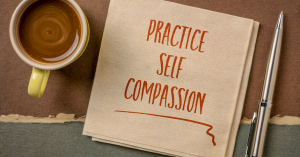By Parth Patel, Mobile Crisis Supervisor at CommUnity

May is Mental Health Awareness Month. This is part one in a multi-part blog series about taking care of your mental health.
The pandemic and adjusting to a more isolated routine for the safety of ourselves and our community came with its own set of struggles. We are now at a point where many of us are re-adjusting to some pre-COVID activities, such as returning to in-person office environments where we are having to adjust to being around people again. This transition to pre-COVID routines can come with its own set of obstacles. Cultivating self-compassion, or inner resilience, during these tumultuous times can give us the encouragement we need to tackle life’s many responsibilities.
So, What is self-compassion?
Think about the last time you felt compassion towards a good friend in your life when they were experiencing any sort of stress. This involves first noticing that they were suffering. In this interaction, it’s likely that you felt some empathy, kindness, and motivation to help this person out. Now, think about the last time you were suffering. How did you respond to yourself in this situation? There may be a huge difference in these two responses and that is okay. Self-compassion can be a tool that we use. Since we are able to direct kindness, empathy, and understanding towards others, we are also capable of directing it to ourselves when we need it most. Self-compassion allows you to be mindful or to notice your current hurts or personal failures and then process with them without judgement. You might try saying something kind to yourself like, “Wow, what you are going through is so difficult right now. I know how much you really wanted ____, so it’s okay to feel angry about this. Let’s do something relaxing right now.” What a statement like this is doing is:
- Noticing the emotion caused by the experience
- Acknowledging that it’s okay and normal to feel this emotion based on the circumstances
- Thinking of an activity like getting tea, walking outside, watching YouTube videos, resting, etc. can be a form of self-soothing to manage presenting painful emotions.
Here are three components of self-compassion:
- Self kindness vs self judgement: Many of us are used to being overly self-critical when we are experiencing stress or personal failures. What self-compassion can do is help us remember that being imperfect, going through challenges, and dealing with uncomfortable emotions is unavoidable. Instead, we can try to be kind and empathetic towards ourselves to see if this changes how we feel. Self-criticism can only take us so far before we start to feel worse about our situation and worse about ourselves, and ultimately isn’t very helpful.
- Common humanity vs isolation: Remembering that when we are suffering, it means that we are human. Of course we are imperfect and will make mistakes. Suffering is part of the human experience and can be viewed as something we all have in common instead of something that only affects “me” alone. Remembering this can make it feel less like you failed, and more that this is just one example of something that can happen in your life and that you can learn from.
- Mindfulness vs. over identification: Practicing mindfulness does not involve pushing down emotions. It simply means noticing them and becoming curious towards them in a non-judgmental way. Being mindful of our uncomfortable emotions will take practice and time. You may even notice that you over-identify with these underlying emotions and spiral into a negative reactive state. Instead, focus on figuring out what emotions you are feeling, and why they might be coming up for you, rather than trying to judge if it’s “right or wrong” for you to feel that way.
Finally, here are some exercises that you can start to use if you are interested in practicing self-compassion in your own life;
- Next time you are feeling hurt, anxious, angry, or any uncomfortable emotion, ask yourself, “How would I treat a good friend if they were in this situation?” Use this response to give yourself the words or actions that you need. Then, notice how you feel after this exercise.
- Self-Compassion Break: Imagine a situation that is causing you some anxiety or stress. Now say to yourself one of the following, “Ouch, this hurts” OR “This is stressful.” Then say something along the lines of “Other people feel this way” or even “Everyone struggles from time to time.” Finally give yourself kindness in this moment by asking yourself what you need to hear to express kindness to yourself. One that I personally love using is, “May I be strong, may I be patient, and may I give myself the compassion I need.” Again, notice how you feel after this exercise.
Remember, as we are slowly getting vaccinated, being more social, and re-adjusting to office life once again, it may be challenging to physically be around people, even when we care deeply for them. These feelings can come with extra distractions from people around you, workplace drama/gossip, and not having access to self-care practices that you were able to use at home. Allow yourself plenty of breaks filled with self-compassion throughout the day and see if this helps support a smoother transition back to the office.
And remember, if it feels too overwhelming or that you aren’t able to handle those things on your own, the trained crisis counselors at CommUnity are here to help. You can reach out to our 24/7 crisis phone or text lines, or if you need to speak to someone in person, our 24/7 Mobile Crisis team.
Call/Text: 1-855-325-4296
Chat: IowaCrisisChat.org
Mobile Crisis Outreach: Call 1-855-800-1239 and ask to speak with Mobile Crisis.